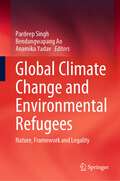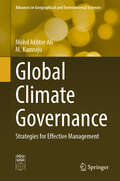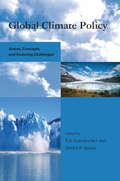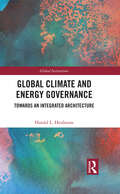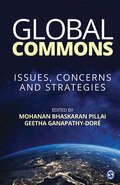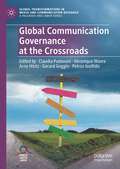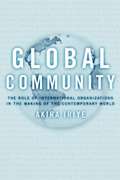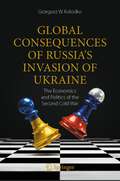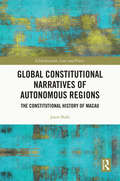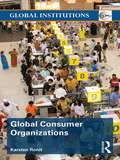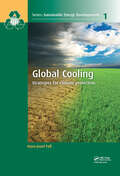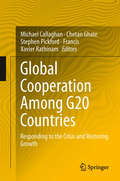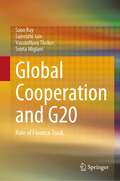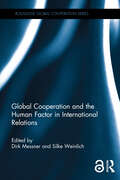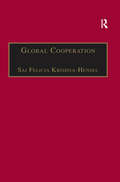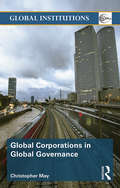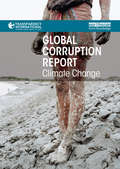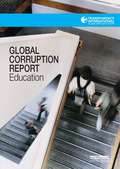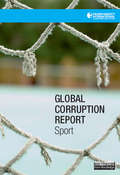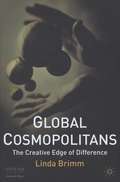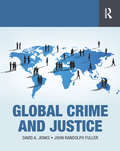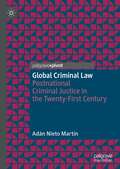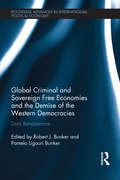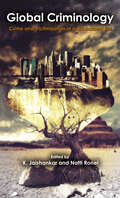- Table View
- List View
Global Climate Change and Environmental Refugees: Nature, Framework and Legality
by Pardeep Singh Anamika Yadav Bendangwapang AoThis book explores the possibilities of understanding the concept of climate refugees in order to ascribe to a consensual agreement that climate refugees are evident and this situation is a reality.A framework to study both empirically and theoretically is presented in a detailed manner so that it may become a resource for understanding the challenges of climate refugees.Through discussion and analysis the book presents potential answers to such questions as:● Why has the international system been so short-sighted and has not given importance to the problems of climate migrants and refugees?● How to identify a climate refugee?● How do you justify a climate refugee or a migrant?● What are internally displaced people? Should we call them just refugees?The book covers the interdisciplinary nature of climate refugees and the perspectives of social science. The empirical findings provides an edge to holistically understanding climate refugees.This book discusses the concept of, what really is a climate refugee, and the necessary factors to make it an important part of the climate discourse. The legality of the term is missing in international parlance, and the academic discourse should provide the necessary critique required for the evolution of the subject under study. Therefore, the major objective of the book is to make the subject of climate migration known to all.
Global Climate Governance: Strategies for Effective Management (Advances in Geographical and Environmental Sciences)
by Mohd Akhter Ali M. KamrajuThis book serves as a comprehensive and insightful guide to the strategies and mechanisms that underpin effective climate governance on a global scale. From the Paris Agreement to the ongoing efforts within the United Nations Framework Convention on Climate Change (UNFCCC), this book offers an in-depth examination of the international and national initiatives that have emerged to address the intricate and multifaceted problem of climate change. It also provides an exploration of the scientific, political, and economic forces shaping the global climate landscape, casting a discerning light on the evolving dimensions of climate governance. The key features of the book are: 1) Understanding the Science: The book lays the foundation for a comprehensive understanding of the scientific principles underpinning climate change. 2) Political Dynamics: It delves into the intricacies of international climate negotiations, the roles played by major stakeholders, and the historical development of seminal climate agreements. 3) National Policies: The book goes beyond the international arena to investigate the diverse approaches and strategies adopted by nations worldwide. It explores their efforts to mitigate emissions, adapt to changing climate conditions, and promote sustainability at the national level. 4) Case Studies: Real-world case studies drawn from various regions and industries illuminate the successes and challenges of climate governance. These case studies offer valuable lessons for readers seeking practical insights into climate change solutions. 5) Innovations and Solutions: The book showcases the innovative technologies and strategies being developed to combat climate change. 6) Balanced Perspective: The book embraces a balanced perspective that confronts the complexities of climate governance, while also offering a beacon of hope by presenting actionable solutions for a sustainable, resilient future.
Global Climate Policy: Actors, Concepts, and Enduring Challenges (Global Environmental Accord: Strategies for Sustainability and Institutional Innovation)
by Urs Luterbacher Detlef F. SprinzAnalyses of the international climate change regime consider the challenges of maintaining current structures and the possibilities for creating new forms of international cooperation.The current international climate change regime has a long history, and it is likely that its evolution will continue, despite such recent setbacks as the decision by President Donald Trump to withdraw the United States from the Paris Agreement of 2015. Indeed, the U.S. withdrawal may spur efforts by other members of the international community to strengthen the Paris accord on their own. This volume offers an original contribution to the study of the international political context of climate change over the last three decades, with fresh analyses of the current international climate change regime that consider both the challenges of maintaining current structures and the possibilities for creating new forms of international cooperation.The contributors are leading experts with both academic and policy experience; some are advisors to governments and the Climate Secretariat itself. Their contributions combine substantive evidence with methodological rigor. They discuss such topics as the evolution of the architecture of the climate change regime; different theoretical perspectives; game-theoretical and computer simulation approaches to modeling outcomes and assessing agreements; coordination with other legal regimes; non-state actors; developing and emerging countries; implementation, compliance, and effectiveness of agreements; and the challenges of climate change mitigation after the Paris Agreement.ContributorsMichaël Aklin, Guri Bang, Daniel Bodansky, Thierry Bréchet, Lars Brückner, Frank Grundig, Jon Hovi, Yasuko Kameyama, Urs Luterbacher, Axel Michaelowa, Katharina Michaelowa, Carla Norrlof, Matthew Paterson, Lavanya Rajamani, Tora Skodvin, Detlef F. Sprinz, Arild Underdal, Jorge E. Viñuales, Hugh Ward
Global Climate and Energy Governance: Towards an Integrated Architecture (Global Institutions)
by Harald L. HeubaumTracing the changing activities of international bureaucracies active in global climate and energy governance, this book provides an in-depth analysis of processes of institutional innovation and governance integration between the two fields. It shows that rather than the consequence of a designed strategy, governance integration – the convergence of approaches and practices among different actors within one or between two or more governance architectures – has come as the result of organizational changes arising from the international bureaucracies’ various efforts to pursue and broaden their mandate in a complex and dynamic global policy environment. Each of the three cases analyzed (the UNFCCC Secretariat, the IEA Secretariat and the World Bank) began their life focused on particular activities that today, following periods of sustained organizational change, make up only part of their operations. Beyond creating greater synergies for cooperation across the governance architectures, improving policies, and mobilizing greater investment to tackle the climate emergency, the book shows governance integration to have contributed to preserving and expanding the role and relevance of all three international bureaucracies.This book will be of interest to students and scholars of global climate and energy governance, climate policy, and international organizations and their bureaucratic arms. Practitioners will find this book useful in thinking about why innovation in governance emerges and how it may be directed.
Global Commons: Issues, Concerns and Strategies
by Mohanan Bhaskaran Pillai Geetha Ganapathy-DoréGlobal Commons: Issues, Concerns and Strategies presents a comprehensive international perspective on the global commons—natural resource domains that are not subject to national jurisdictions and are accessible to all nations. These include the oceans, atmosphere and outer space, and specific locations such as Antarctica. Due to their critical importance in maintaining human lives and livelihoods, and their vulnerability to depletion, the collaborative preservation of the global commons is of great relevance to all human communities. Leading world powers, such as France, are increasingly adopting environmental policies as key to their functioning as democracies. After the Paris Climate Conference, there has been a spurt in cooperation between major nations, such as France and India, in the fight against climate change. This book provides exhaustive coverage of all the major facets of preservation of the global commons. It will, therefore, prove indispensable to all stakeholders in a new, just and sustainable world order.
Global Communication Governance at the Crossroads (Global Transformations in Media and Communication Research - A Palgrave and IAMCR Series)
by Petros Iosifidis Gerard Goggin Arne Hintz Claudia Padovani Véronique WavreThis edited volume addresses current challenges, trends and transformations in global communication governance. Exploring changes in the actors, issues, values and contexts of media and communications, it investigates the crossroads that media policy is facing and offers visions for the future. A diverse range of scholars and expert practitioners discuss what regulatory reforms and governing mechanisms are required to advance democratic participation and fundamental rights in platform societies.Organized around five sections, the volume considers the geopolitics of emerging communication orders; the changing roles of actors and stakeholders; the challenge of embedding rights and values in regulatory arrangements; the intersection of technology and policy; and the need to rethink epistemologies and methodologies for researching this field.Contributions from different disciplines and cultural backgrounds include provocative think pieces and longer analyses. All chapters are grounded in historically-aware understandings of contemporary transformations, while anticipating dynamics of our communication futures.
Global Community: The Role of International Organizations in the Making of the Contemporary World
by Akira IriyeExamines the concept of "global community" by looking at the emergence, growth, and activities of international organizations--both governmental and nongovernmental--from the end of the nineteenth century to today.
Global Consequences of Russia's Invasion of Ukraine: The Economics and Politics of the Second Cold War
by Grzegorz W. KolodkoThis book highlights the geopolitical and economic consequences of the Russia’s invasion of Ukraine. The author, a key architect of Polish eco-nomic reforms and the most frequently cited economist from post-Com-munist countries, shares new insights into the causes and mechanisms of the Second Cold War. Written in an unorthodox, bold and lucid style, the book raises provocative issues and provides convincing answers to some of the most difficult questions, such as who the true beneficiaries and interest groups behind the war are, and what their motives and con-flicting goals are. The book also introduces readers to the greatest challenge of our time, climate change, and explores the long-term effects of the current arms race and rearmament spiral on global warming. This interdisciplinary book, which also addresses the challenges of inflation, mass migrations and clashes between democracy and authoritarianism, will appeal to anyone interested in the contemporary geopolitical shifts triggered by the Russia’s invasion of Ukraine, but also in the dynamics and directions of the evolution of the new cold war.
Global Constitutional Narratives of Autonomous Regions: The Constitutional History of Macau (Globalization: Law and Policy)
by Jason BuhiWith international attention focused on Hong Kong, many forget that Macau also exists in a delicate `one country, two systems’ (OCTS) balance with mainland China. This book provides insights into the circumstances surrounding the less-understood half of China’s OCTS policy, including the stagnation of representational government, and the location of any Macau characteristics in the Macau Basic Law. Despite being Hong Kong’s sister `Special Administrative Region’ (SAR) within the People’s Republic of China, Macau’s unique constitutional development under Portuguese and Chinese administration remains under-appreciated despite its potential contributions to local, national, and international constitutional discourse. Utilizing a multi-disciplinary approach including doctrinal, historical, and comparative methodologies, this work fills that gap. The research blends Portuguese, Chinese, and foreign-language sources in order to reconstruct a balanced constitutional narrative. The book focuses on a consequential effect of globalization – that is, the assimilation of a longstanding and unique constitutional order by a new hegemonic sovereign – including processes for internationalization as China opened up, legal harmonization of two distinct legal and socioeconomic orders, juridification of local affairs with the establishment of a new local court system in preparation for handover to the Chinese regime, and democratization (or the lack thereof) among the various communities comprising the Macanese polity before and since. Focusing on Macau’s unique development at the crux of European and Chinese empires, and the role it plays as a mirror for Chinese intentions vis-a-vis Hong Kong today, the book will be of interest to those working in Constitutional Law, Politics and History.
Global Consumer Organizations (Global Institutions)
by Karsten RonitAs corporate activity continues to expand in line with the continued globalization of the economy there is an increasing demand for establishing rules to regulate the trans-boundary activities of firms and their many and complex relations with consumers. Until now, sources of knowledge in this field have been scattered and unsystematic and this volume fills a key gap in current literature, providing a concise and accessible introduction to the role of global consumer organizations. The book: Provides an historical overview that traces the early attempts made before WWII to formulate elements of global consumer policy, highlighting key issues and initiatives up until the 1980s. Outlines the groups of organizations that are responsible for dealing with consumer issues in areas such as trade and development, socio-economics and the environment, including the Organisation for Economic Co-operation and Development, World Trade Organization, International Monetary Fund, United Nations Conference on Trade and Development, and World Bank. Analyses the group of special intergovernmental organizations that address the problems of specific consumer segments, industries and service-providers, including the World Health Organization, International Telecommunication Union and World Tourism Organization. Evaluates both current and future challenges and dilemmas facing consumer organizations, including addressing the continued issues of coordination between them. Providing a much-needed overview of this key area in international organization, Global Consumer Organizations will be of interest to students and scholars in a range of areas, including international political economy, consumer behaviour, international organizations, economic policy and consumer behaviour.
Global Cooling: Strategies for Climate Protection (Sustainable Energy Developments)
by Hans-Josef FellThis book redefines climate protection measures and readjusts climate protection targets in line with what is scientifically necessary and economically feasible. The reader is provided with an overview of recent developments and failings in, and successful instruments for, fighting climate change and global warming.Effective climate protection meas
Global Cooperation Among G20 Countries
by Stephen Pickford Michael Callaghan Chetan Ghate Francis Xavier RathinamAt the outbreak of the global financial crisis, 2008, the G20 was widely acknowledged as helping prevent an even more serious decline in the global economy. It helped to calm the panic in financial markets and articulate a set of possible policy options to restore global stability and growth. However, as the dual-track recovery set in, policy options for advanced economies and EMEs diverged. Within this context, this book will explore the scope for cooperation amongst the G20 and the diverging challenges and the intricate interconnectedness of policy options between advanced economies and the EMEs within the G20.
Global Cooperation and G20: Role of Finance Track
by Saon Ray Smita Miglani Samridhi Jain Vasundhara ThakurThis book focuses on one of the two G20 tracks, the finance track. It examines the evolution of the finance track in G20, the organizational structure of the finance track, and the role of international organizations in reforming the financial architecture. It discusses how the agenda is formed and driven by the political economy of the host country as well as the imperative of the time. It also documents the finance track themes taken up by different G20 presidencies over the years. Some of the common threads between the G20 emerging economies’ presidencies in terms of the finance track themes that the G20 leaders have considered include financial sector regulation and reform, reform of international financial institutions, global growth and macroeconomic policies, international taxation, and financial inclusion. The book is an excellent resource for the researchers of international economics as well as for policymakers.
Global Cooperation and the Human Factor in International Relations (Routledge Global Cooperation Series)
by Silke Weinlich Dirk MessnerThis book aims to pave the way for a new interdisciplinary approach to global cooperation research. It does so by bringing in disciplines whose insights about human behaviour might provide a crucial yet hitherto neglected foundation for understanding how and under which conditions global cooperation can succeed. As the first profoundly interdisciplinary book dealing with global cooperation, it provides the state of the art on human cooperation in selected disciplines (evolutionary anthropology and biology, decision-sciences, social psychology, complex system sciences), written by leading experts. The book argues that scholars in the field of global governance should know and could learn from what other disciplines tell us about the capabilities and limits of humans to cooperate. This new knowledge will generate food for thought and cause creative disturbances, allowing us a different interpretation of the obstacles to cooperation observed in world politics today. It also offers first accounts of interdisciplinary global cooperation research, for instance by exploring the possibilities and consequences of global we-identities, by describing the basic cooperation mechanism that are valid across disciplines, or by bringing an evolutionary perspective to diplomacy. This book will be of great interest to scholars and postgraduates in International Relations, Global Governance and International Development.
Global Cooperation and the Human Factor in International Relations (Routledge Global Cooperation Series)
by Dirk Messner and Silke WeinlichThis book aims to pave the way for a new interdisciplinary approach to global cooperation research. It does so by bringing in disciplines whose insights about human behaviour might provide a crucial yet hitherto neglected foundation for understanding how and under which conditions global cooperation can succeed.As the first profoundly interdisciplinary book dealing with global cooperation, it provides the state of the art on human cooperation in selected disciplines (evolutionary anthropology and biology, decision-sciences, social psychology, complex system sciences), written by leading experts. The book argues that scholars in the field of global governance should know and could learn from what other disciplines tell us about the capabilities and limits of humans to cooperate. This new knowledge will generate food for thought and cause creative disturbances, allowing us a different interpretation of the obstacles to cooperation observed in world politics today. It also offers first accounts of interdisciplinary global cooperation research, for instance by exploring the possibilities and consequences of global we-identities, by describing the basic cooperation mechanism that are valid across disciplines, or by bringing an evolutionary perspective to diplomacy.This book will be of great interest to scholars and postgraduates in International Relations, Global Governance and International Development.
Global Cooperation: Challenges and Opportunities in the Twenty-First Century (Global Interdisciplinary Studies Series)
by Felicia KrishnaHenselThe twenty-first century global community is confronted with unprecedented challenges as well as unique opportunities. The degree to which it can establish and institutionalize norms and mechanisms designed to promote and sustain meaningful global cooperation will determine the future course of civilization. This volume brings together a broad range of scholars to highlight some of the areas of contemporary transnational cooperation and to examine the scope and levels at which cooperation can and does take place. The study examines the issue of weapons of mass destruction, explores the promises of biotechnology and space technology, and investigates the roles of global conventions and institutions as strategies for addressing the common threats facing the international system. In short, the volume raises important, timely issues regarding the challenges and opportunities confronting the global community which both policy makers and academicians will find informative and thought-provoking in their efforts to understand the nature and complexity of the twenty-first century global community.
Global Corporations in Global Governance (Global Institutions)
by Christopher MayThis book offers a concise and accessible overview and analysis of the place of large multinational and regional corporations in the political economy of global governance.May argues that not only do corporations have an impact on the institutions of global governance, but they must be understood as a multifaceted institution of global governance in their own right, controlling and shaping significant aspects of the global political economy. Topics include: What are global corporations? Corporations and global governance The legal personality of the corporation Corporations and power Corporations and tax The future role of corporations in a post crisis global system Highlighting the central role of corporations in the generation and reproduction of norms in global governance, this work shows that corporations’ practices and relations are themselves both subjects, and sources of, global governance. It offers an enhanced understanding of the complex of issues that pattern the corporate global governance in the contemporary political economy and will be of interest to students in areas including IPE, global governance and international organizations.
Global Corruption Report: Climate Change
by Transparency InternationalThe global response to climate change will demand unprecedented international cooperation, deep economic transformation and resource transfers at a significant scale. Corruption threatens to jeopardise these efforts. Transparency International's Global Corruption Report: Climate Change is the first publication to comprehensively explore such corruption risks. More than fifty leading experts and practitioners contribute, covering four key areas: governance: investigating major governance challenges towards tackling climate change mitigating climate change: reducing greenhouse gas emissions with transparency and accountability adapting to climate change: identifying corruption risks in climate-proofing development, financing and implementation of adaptation forestry governance: responding to the corruption challenges plaguing the forestry sector, and how these challenges need to be integrated into current international strategies to halt deforestation and promote reforestation. The Global Corruption Report: Climate Change provides essential policy analysis to help policy-makers, practitioners and other stakeholders understand these risks and develop effective responses at a critical point in time when the main architecture for climate governance is being developed.
Global Corruption Report: Education
by Transparency InternationalCorruption and poor governance are acknowledged as major impediments to realizing the right to education and to reaching the Millennium Development Goal of universal primary education by 2015. Corruption not only distorts access to education, but affects the quality of education and the reliability of research findings. From corruption in the procurement of school resources and nepotism in the hiring of teachers, to the buying and selling of academic titles and the skewing of research results, major corruption risks can be identified at every level of the education and research systems. Conversely, education serves as a means to strengthen personal integrity and is a critical tool to address corruption effectively. The Global Corruption Report (GCR) is Transparency International’s flagship publication, bringing the expertise of the anti-corruption movement to bear on a specific corruption issue or sector. The Global Corruption Report on education consists of more than 70 articles commissioned from experts in the fields of corruption and education, from universities, think-tanks, business, civil society and international organisations. The Global Corruption Report on education and academic research will provide essential analysis for understanding the corruption risks in the sector and highlight the significant work that has already been done in the field to improve governance and educational outcomes. This will be an opportunity to pull together cutting edge knowledge on lessons learnt, innovative tools and solutions that exist in order to fight corruption in the education sector.
Global Corruption Report: Sport
by Transparency InternationalSport is a global phenomenon engaging billions of people and generating annual revenues of more than US$ 145 billion. Problems in the governance of sports organisations, fixing of matches and staging of major sporting events have spurred action on many fronts. Yet attempts to stop corruption in sport are still at an early stage. The Global Corruption Report (GCR) on sport is the most comprehensive analysis of sports corruption to date. It consists of more than 60 contributions from leading experts in the fields of corruption and sport, from sports organisations, governments, multilateral institutions, sponsors, athletes, supporters, academia and the wider anti-corruption movement. This GCR provides essential analysis for understanding the corruption risks in sport, focusing on sports governance, the business of sport, planning of major events, and match-fixing. It highlights the significant work that has already been done and presents new approaches to strengthening integrity in sport. In addition to measuring transparency and accountability, the GCR gives priority to participation, from sponsors to athletes to supporters an essential to restoring trust in sport.
Global Cosmopolitans
by Linda BrimmAs globalization creates the need for leaders who transcend national borders, this book provides an insider's view of what makes them special. This is the first book to present a framework for understanding this fast-growing and influential group and it provides tools for readers to discover their own inner competitive edge.
Global Crime and Justice
by John Randolph Fuller David A. JenksGlobal Crime and Justice offers a truly transnational examination of both deviance and social controls around the world. Unlike comparative textbooks detailing the criminal justice systems of a few select nations, or cataloging types of international crimes that span multiple legal jurisdictions, Global Crime and Justice provides a critical and integrated investigation into the nature of crime and how different societies react to it. The book first details various types of international crime, including genocide, war crimes, international drug and weapons smuggling, terrorism, slavery, and human trafficking. The second half covers international law, international crime control, the use of martial law, and the challenges of balancing public order with human and civil rights. Global Crime and Justice is suitable for use in criminology and criminal justice departments, as well as in political science, international relations, and global studies programs. It will appeal to all who seek an academically rigorous and comprehensive treatment of the international and transnational issues of crime and social order.
Global Criminal Law: Postnational Criminal Justice in the Twenty-First Century
by Adán Nieto MartínThis book explores the emergence of an ius puniendi outside state criminal law and beyond international criminal law. The study connects with the reflections that have been made for some years in global law studies, showing how this trend also has a clear manifestation in the field of criminal law. The analysis begins by mapping out the different manifestations of this new global criminal regulation. This includes very diverse areas, ranging from judicial cooperation to the problems involved in the application of criminal sanctions in failed states, or investigations carried out on the internet. New sanctioning systems are also studied, such as the debarment regime of the World Bank or the sanctions in the hands of international sports federations. It is a question of discovering all criminal law – understood in a broad sense – that lies outside the confines of the state.
Global Criminal and Sovereign Free Economies and the Demise of the Western Democracies: Dark Renaissance (Routledge Advances in International Political Economy)
by Robert J. Bunker Pamela Ligouri BunkerMuch has been written about the many economic benefits of globalization and the triumph and spread of democratic liberalism with the end of the Cold War, following the demise of the Soviet Union. This work takes issue with such "wine and roses" perspectives about the future of the Western democracies and their faith-based views on the moral purity of a globalized marketplace. It also questions many of the assumptions found in the status quo reinforcing discipline of international political economy (IPE)—a discipline that focuses on the formal and legitimate economies and the façade they present that international relations and commerce is still dominated and dictated solely by the old Westphalian state centric system. Having highlighted these concerns, this book looks at two major themes. The first theme focuses on the theoretical perception that a "Dark Renaissance" is taking place globally—one in which the Western liberal democracies and its citizens are ill prepared to respond because it exists at the trans-civilization level, bridging the modern to the post-modern world. The second theme focuses on the actual process of state deconstruction that is taking place. This process is leading to what may become the very undoing of the democracies. Drawing together experts from a variety of backgrounds, this work explores the increasing shift away from formal based capitalism and evaluates through case studies how different states are responding to the challenges they face. This work will be of great interest to students and scholars of international political economy.
Global Criminology: Crime and Victimization in a Globalized Era
by K. Jaishankar Natti RonelGlobal criminology is an emerging field covering international and transnational crimes that have not traditionally been the focus of mainstream criminology or criminal justice. Global Criminology: Crime and Victimization in a Globalized Era is a collection of rigorously peer-reviewed papers presented at the First International Conference of the So
